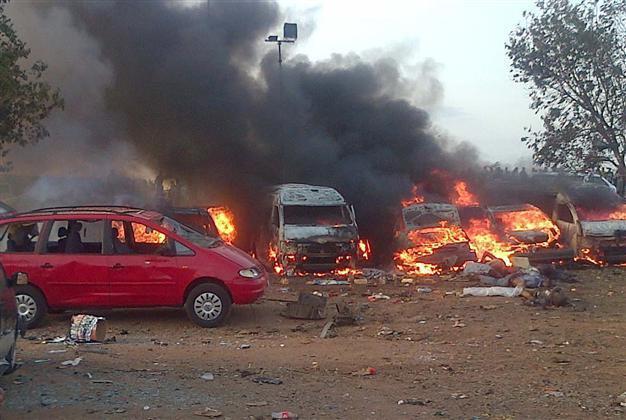71 killed, 124 injured in blasts at Nigeria bus station
ABUJA - Reuters

Vehicles burn after an attack in Abuja on April 14, 2014. AFP Photo
A morning rush hour bomb killed at least 71 people at a Nigerian bus station on the outskirts of the capital on Monday, raising concerns about the spread of an Islamist insurgency after the deadliest ever attack on Abuja.
Suspicion fell on Boko Haram, though there was no immediate claim of responsibility from the Islamists who are mainly active in the northeast. As well as 71 dead, police said 124 were wounded in the first attack on the federal capital in two years.
Security experts suspect the explosion was inside a vehicle, said Air Commodore Charles Otegbade, director of search and rescue operations. The bus station, 8 km (5 miles) southwest of central Abuja, serves Nyanya, a poor, ethnically and religiously mixed satellite town where many residents work in the city.
"I was waiting to get on a bus when I heard a deafening explosion, then saw smoke," said Mimi Daniels, who escaped from the blast with minor injuries to her arm.
"People were running around in panic."
Bloody remains lay strewn over the ground as security forces struggled to hold back a crowd of onlookers and fire crews hosed down a bus still holding the charred bodies of commuters.
"These are the remains of my friend," said a man, who gave his name as John, holding up a bloodied shirt. "His travel ticket with his name on was in the shirt pocket."
The attack underscored the vulnerability of Nigeria's federal capital, built in the 1980s in the geographic centre of the country to replace coastal Lagos as the seat of government for what is now Africa's biggest economy and top oil producer.
Boko Haram militants fighting for an Islamic state have largely been confined to the remote northeast. They have been particularly active there over the past few months and are increasingly targeting civilians they accuse of collaborating with the government or security forces.
No surprise "In some ways it's not a big surprise," said Kole Shettima, director of the Abuja office of U.S. charitable institution, the MacArthur Foundation. "The situation has been escalating.
"It's a statement that they are still around and they can attack Abuja when they want, and instill fear."
The Islamists, who want to carve an Islamic state out of Nigeria, have in the past year mostly concentrated their attacks in the northeast, where their insurgency started.
There had been no such violence near the capital since suicide car bombers targeted the offices of the newspaper This Day in Abuja and the northern city of Kaduna in April 2012.
Security forces at the time said that was because a Boko Haram cell in neighbouring Niger state had been broken up.
A Christmas Day bombing of a church in Madalla, on the outskirts of Abuja, killed 37 people in 2011, although the main suspect in that attack is now behind bars. Boko Haram also claimed responsibility for a bomb attack on the United Nations' Nigeria headquarters that killed 24 people on Aug. 26, 2011.
Boko Haram, which in the Hausa language of largely Muslim northern Nigeria means broadly "Western education is sinful", is loosely modeled on the Taliban movement in Afghanistan, and has forged ties with al Qaeda-linked militants in the Sahara.
